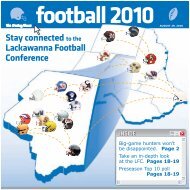racetracks
I want to be left alone! - The Times-Tribune
I want to be left alone! - The Times-Tribune
- No tags were found...
You also want an ePaper? Increase the reach of your titles
YUMPU automatically turns print PDFs into web optimized ePapers that Google loves.
R E S T A U R A N T A N D B A R<br />
Fine Dining<br />
1140 R OUTE 315, S UITE 101<br />
W ILKES -B ARRE , PENNSYLVANIA 18711<br />
O PERATING H OURS :<br />
D INNER :<br />
M ONDAY T HROUGH T HURSDAY 5:00 PM - 10:00 PM<br />
F RIDAY - S ATURDAY 5:00 PM - 11:00 PM<br />
L UNCH :<br />
M ONDAY T HROUGH F RIDAY 11:00 AM - 2:00 PM<br />
F OR R ESERVATIONS , P LEASE C ALL<br />
570.270.9292<br />
The ethics of asking for Medicaid<br />
By Lynn Evans<br />
When does it become ethical to “spend<br />
down”your assets to qualify a loved one for<br />
Medicaid? Is there ever a “right”set of circumstances<br />
to do so? Is entitlement to<br />
these benefits a right of every American?<br />
Or should your end-of-life care and its attendant<br />
costs be your responsibility?<br />
Many financial professionals<br />
today are facing these and more<br />
difficult questions when their<br />
clients or their clients’ children<br />
come to them for help in making<br />
Mom or Dad qualify for government<br />
aid in nursing care costs.<br />
The dilemma is in the question.<br />
Is it ethical to do this?<br />
Suppose the family assets consist<br />
of a farm, which has been in<br />
the family for the last two hundred<br />
years. If the next generation is<br />
actively farming the land and generating<br />
a living from the farm, is it right for the<br />
government to be the auctioneer at the<br />
death of the elderly farmer who had no<br />
assets, in an effort to recover the costs<br />
for his stay in a nursing home?<br />
If not, then what about the children of<br />
the corporate executive who expected to<br />
inherit Dad’s generous stock portfolio<br />
when he passed on and demanded from<br />
their attorney that he make Dad eligible<br />
for Medicaid to preserve their inheritance?<br />
Do we have a sense of right for the first<br />
case and disdain for the second? Why?<br />
What about being responsible for our<br />
own medical care and its costs?<br />
Is that concept as irrelevant a moral<br />
standard as the mortgage-free home?<br />
Probably so.<br />
In the last generation, people had multigenerational<br />
households with the traditional<br />
wife/mother at home.<br />
The daily care of all family members fell<br />
on her shoulders with children doing their<br />
fair share. The multi-generational family<br />
rarely exists anymore and care of elderly<br />
parents is relegated to the occasional visit<br />
from the progeny who live hours or days<br />
away.Grandchildren are committed to<br />
sports, music lessons and private tutoring<br />
to guarantee great SAT scores.<br />
Our current societal values dismiss the<br />
inclusion of care for the elderly as a top<br />
priority, so we transfer that responsibility<br />
and cost to the local agencies and the<br />
federal government. And then we rail<br />
against the authorities when they deny<br />
the care for free.<br />
What’s missing in this equation?<br />
Maybe the answer is a better long-term<br />
care program, which gives incentive to the<br />
American public to pay the premiums for<br />
care that extends into the home, rather<br />
than only the traditional Clorox-perfumed,<br />
heaven’s waiting rooms we call nursing<br />
homes. Not to put the knock on the nursing<br />
home industry. They do a heroic job<br />
with limited funds. Very limited funds.<br />
And the work is not fun.<br />
Given that no one among us<br />
wants to be in these dreadful<br />
places, it tears at our heartstrings<br />
to make the decision to<br />
put Mom or Dad in one and<br />
wonder why there is no alternative.<br />
There could be.<br />
As the Baby Boomer generation<br />
nears the age where the<br />
nursing home looms as a distinct<br />
possibility, their immense<br />
Evans<br />
power as a consumer group<br />
will affect the choices we now have.<br />
But until that happens, where do we<br />
draw the line?<br />
Granted, the needs of the “community<br />
spouse” (a lovely euphemism for the<br />
spouse left at home when the other is in<br />
a nursing home) have to be taken care of<br />
and being able to preserve some type of<br />
financial security for that person is paramount.<br />
So how much is enough?<br />
Elder care attorneys who specialize in<br />
this type of planning have some tried and<br />
true methods to make this happen. And<br />
still within the guidelines of the federal<br />
government, but it’s not that much.<br />
Even though the Feds set the guidelines,<br />
the state has the ultimate say in what that<br />
amount is. It currently lands somewhere<br />
around $90,000 in assets (the house?) and<br />
only $2,000 in cash. So should that person<br />
be penalized because his or her<br />
spouse needs long-term care?<br />
Is it fair to force poverty on this community<br />
spouse in order for her husband to<br />
get the care he needs, which she can’t<br />
provide? What happens if she then has to<br />
go into a nursing home, too?<br />
There are lovely options like gifting to<br />
children, trusts, inter-spousal transfers,<br />
immediate annuities, and so forth.<br />
Although all of them are legitimate<br />
options, each of them carries great risk of<br />
coming back to haunt you. The only viable<br />
option is a long-term care policy, which<br />
allows for home medical care as well as<br />
nursing home stays.<br />
Lynn S. Evans, certified financial planner, is<br />
president of Northeastern Financial<br />
Consultants, a Clarks Summit-based firm<br />
and licensee of financial life planning tools<br />
and materials.Visit the company on the Web<br />
at www.nefci.com. or e-mail info@nefci.com.<br />
PNC Foundation presents gift to Marywood University<br />
Representatives of PNC<br />
Bank recently presented<br />
a check in the amount of<br />
$20,000 from the PNC<br />
Foundation to Marywood<br />
University. The funds represent<br />
the bank’s final<br />
payment of a $100,000<br />
pledge. Seen at the<br />
check presentation<br />
were, left to right, Peter<br />
J. Danchak, president,<br />
PNC Bank Northeast<br />
Pennsylvania; Sister<br />
Mary Reap, I.H.M.,<br />
president, Marywood<br />
University; and Paul<br />
Kosiba, PNC Bank, vice<br />
president, institutional<br />
investment group.<br />
6 • NORTHEAST PENNSYLVANIA BUSINESS JOURNAL • SEPTEMBER 2003




